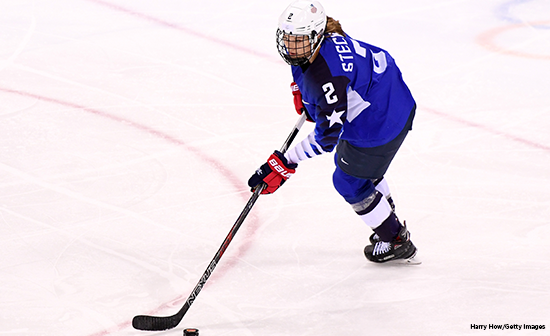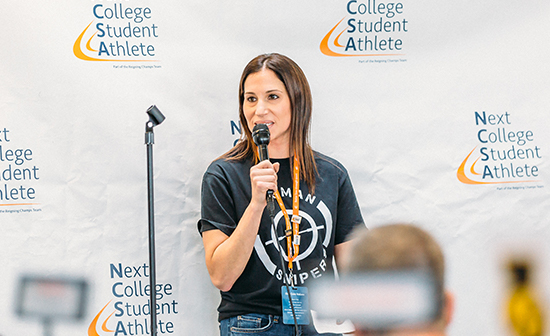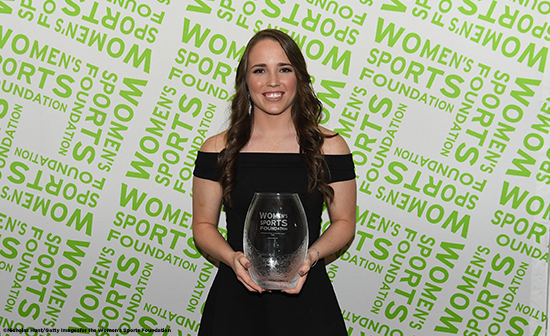At age 24, Lee Stecklein has accomplished more than many people do in a lifetime. Playing defense for the U.S. national women’s ice hockey team, she won a gold medal in her second Winter Olympics last year in PyeongChang, South Korea. It was the first U.S. gold since the inaugural 1998 Olympic women’s hockey tournament. Stecklein’s average ice time of 22:27 per game led the team.
Captaining the Minnesota Whitecaps in the team’s first NWHL season, Stecklein also scored the overtime winner against the Buffalo Beauts in the 2019 Isobel Cup final. The Roseville, Minn. native has also won three NCAA championships with the University of Minnesota Golden Gophers and four straight IIHF Women’s World Championships. We chatted with her during the U.S.’s quest to five-peat at the Women’s Worlds in Espoo, Finland, in which she has helped the Americans qualify for the semifinal match after a 4-0 win over Japan earlier today.
WSF: What is the most important reward that Olympic gold medal gave you?
LS: Knowing we were growing women’s hockey overall was incredibly important to all of us. Being able to bring it back to our communities was really important, too. And accomplishing it with our special group – it was a long year of training together, so to have that pay off in the end was incredibly exciting.
WSF: How do you feel playing sports and being physically active has benefited you?
LS: Being physically active has been a huge part of my life. I’ve learned so much from sports in general. I think it’s really important that girls stay in sports. I saw a statistic from the Women’s Sports Foundation that girls are dropping out at twice the rate by the age of 14. And I just can’t imagine where I would be without hockey or soccer or any of those things in my life. I’ve learned a lot of lessons, and I have a lot of great friends through sports. It’s something I hope to keep in my life. I feel grateful to have had those opportunities.
WSF: During the NWHL All-Star Weekend in Nashville, Tenn., you spoke at the Play Like A Girl summit, along with other female athletes and executives, before girls aged 13 to 17. What was your message?
LS: Stay in sports for as long as you can. Learn as much as you can from them. The on-ice or on-court or whatever stuff you’re doing is important, but you’re learning so many other lessons. Just be open to those. Ask questions, and keep pushing yourself each and every day. It was really exciting to see the girls there. They had to sign up, and they were clearly engaged to listen to the panel.
WSF: Who are your heroes in hockey and in life?
LS: Someone who’s been a role model for me in both areas has been [two-time Women’s Worlds silver medalist and Whitecaps veteran] Winny Brodt. Growing up, she was someone I watched. She played at Roseville High School and for the Gophers, and then played with the U.S. national team. So as someone who had grown up right near me, who had a niece my age that I grew up playing with, Winny had a career that I always followed. She really gave back to the community. She’s still coaching and helping girls’ hockey in Minnesota today. Just to see how she used her career to help others is something I find inspiring.
WSF: Some people might see your hockey resume and say you’ve already done it all. What do you feel like you have left to accomplish?
LS: In this sport, I think we can always keep striving to make it better overall, to keep improving the level of women’s hockey. We’re doing amazing things, and I’d like us to continue to show that to the world. And then, to keep playing in gold medal games for as long as I can!
Lucas Aykroyd is a member of the WSF Digital Contributor Team. His work has appeared in publications that include the New York Times.



